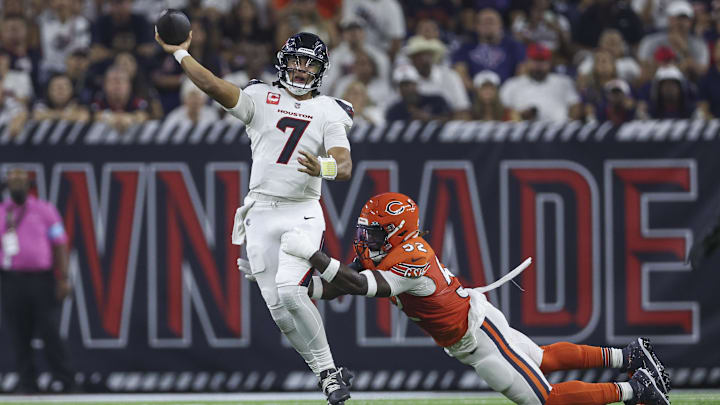C.J. Stroud Shows Template for Caleb Williams in Texans' Victory Over Bears

C.J. Stroud has to be good at darts, the game that hangs on the wall of the local dive bar near the pool tables. At the risk of sounding like captain obvious, this needed to be clarified because Stroud throws many darts on the football field.
I seriously wondered about his dart skills after trying to come up with a creative way to describe Stroud’s precision when he’s standing in the pocket and connecting with his many playmakers on the Houston Texans.
His accuracy is a thing of beauty, but there are reasons why I’m not a poet or a sci-fi novelist (even though I recently binged the Alien movie franchise). Here’s my creativity: Stroud’s accuracy is comparable to the dart guy who’s hitting bull’s eyes with ease and asking people at the bar to pay him to do it again.
Stroud has a way of creating a peaceful box around him while defenders do their best to disrupt it. Once he finds that comfort zone, there’s really no stopping him. It’s as if he’s standing alone and it’s just him and the dart board before hitting Nico Collins in stride. (Soon I’ll make cheesy comparisons about Collins’s game because he’s great at what he does and deserves more attention for it.)
Every quarterback wants a clean pocket, which can be feasible at times for Stroud with Laremy Tunsil at left tackle and Joe Mixon providing a balanced attack. But when it looks easy, Stroud is shooting nearly 100%—yes, that’s not totally true, but totally believable, especially with the darts he threw in the 19–13 victory against the Chicago Bears during Sunday Night Football.
Admiring Stroud’s pinpoint accuracy was a reminder that more young quarterbacks need to focus on doing less outside the pocket and prioritizing the easy throws. The NFL is enamored with finding the next Patrick Mahomes, Lamar Jackson and Josh Allen—three of the game’s best quarterbacks who are known for extending plays in a variety of ways. For that trio, operating in chaos can look easy. But the pocket assassins are just as effective, which is why Stroud, Joe Burrow and Justin Herbert all had sensational rookie seasons.
Bears rookie quarterback Caleb Williams told the Sunday Night Football broadcast crew that he prefers the pocket throws and playing within the scheme over extending plays as a creator. That should be obvious, but Williams has developed a reputation for wow throws on the run that occasionally get him in trouble.
Williams wants to play with the kind of composure Stroud operates under, but that’s not easy for a rookie quarterback with a poor offensive line that has played from behind for most of the first two games this season. Williams’s patience for safe throws wandered before two interceptions in the second half.
The Bears (1–1) attempted to go with the less-is-more approach Sunday night after emphasizing quick throws for Williams’s second career regular-season game. His perfect 5-of-5 opening drive for 55 yards against the Texans (2–0) was a quick improvement from the ugly debut the week prior vs. the Tennessee Titans, a game Chicago managed to win after the defense and special teams scored touchdowns.
Williams won a Heisman Trophy at USC and was the No. 1 pick in April’s draft largely because of the kinds of throws he’s capable of making outside the pocket. He flashed his ability to make tight-window throws while on the run during the preseason, leading Bears fans to believe their quarterback savior had finally arrived in the Windy City.
But attempting the off-platform throws from different angles hindered Williams’s accuracy in his debut last week. It was the kind of rough start that made many wonder whether Williams was as talented as the draft pundits described him.
Williams didn’t lose his elite gifts, but he might need to prioritize the basics, like accuracy, protecting the football and allowing his playmakers to do the heavy lifting. For nearly three quarters, Williams did that against a blitz-happy DeMeco Ryans Texans defense. He finished 23-of-37 for 174 yards and two interceptions. Stroud went 23-of-36 for 260 yards, one touchdown and no turnovers.
Williams didn’t try too hard when his team was stuck at three points for most of the first half. He had a perfectly placed ball to DeAndre Carter in the middle of the field that drew a defensive passing interference call to set up the Bears’ first touchdown drive of the game, trimming the deficit 13–10 late in the first half.
Williams did have a reckless throw across his body to the other side field that was intercepted, but caught a break with the Texans being hit for a holding penalty.
With time, Williams will hopefully learn to trust his offensive line and build chemistry with his many standout pass catchers. It’s important to note, however, that Chicago’s offensive line struggled against the Texans and friendly target Keenan Allen was ruled out due to injury. And if more edge rushers do what Will Anderson Jr. did to the Bears’ offensive line, that will test Williams’s patience weekly when it comes to doing too much outside the pocket.
Perhaps the accuracy that Stroud possesses can’t be taught, but the awareness and timing that he plays with is something Williams and many young quarterbacks should strive for. When the Texans struggled to score points in the second half, Stroud wasn’t afraid to extend plays and make throws on the run. He can create, too, but is a dart thrower first.
